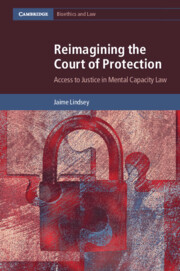Book contents
- Reimagining the Court of Protection
- Cambridge Bioethics and Law
- Reimagining the Court of Protection
- Copyright page
- Dedication
- Contents
- Figures
- Tables
- Acknowledgements
- Table of Statutes
- Table of Cases
- 1 Introduction
- 2 Procedural Justice
- 3 Participation and Voice
- 4 Mediating Disputes
- 5 Expert and Experiential Evidence
- 6 The Courtroom Space and Design
- 7 Conclusions
- References
- Index
- Books in the Series
4 - Mediating Disputes
Published online by Cambridge University Press: 17 September 2022
- Reimagining the Court of Protection
- Cambridge Bioethics and Law
- Reimagining the Court of Protection
- Copyright page
- Dedication
- Contents
- Figures
- Tables
- Acknowledgements
- Table of Statutes
- Table of Cases
- 1 Introduction
- 2 Procedural Justice
- 3 Participation and Voice
- 4 Mediating Disputes
- 5 Expert and Experiential Evidence
- 6 The Courtroom Space and Design
- 7 Conclusions
- References
- Index
- Books in the Series
Summary
Chapter 4 explores the role of alternative dispute resolution, specifically mediation, in CoP proceedings, the first academic piece on this topic. The use of mediation in CoP practice is increasing and there is a trend towards mediation as the primary form of ADR in civil and family justice. In analysing the role of mediation in the CoP, the chapter draws on original empirical data to explore the views of professionals working in mental capacity law. In analysing this data, emphasis is placed on the embodied benefits of flexibly resolving disputes outside of the formalities of the courtroom, as well as the challenges involved in maintaining neutrality, trustworthiness and participation without judicial oversight. The chapter concludes that mediation has an important role to play as a complementary part of the toolkit of a reimagined CoP because it has the potential to provide an improvement in procedural justice. However, the legalism present in discussions of mediation in the empirical data is also highlighted, arguing that if mediation is going to secure an improvement in access to justice, then it needs to be driven by the parties rather than notions of justice predetermined by legal professionals.
Keywords
- Type
- Chapter
- Information
- Reimagining the Court of ProtectionAccess to Justice in Mental Capacity Law, pp. 98 - 147Publisher: Cambridge University PressPrint publication year: 2022

